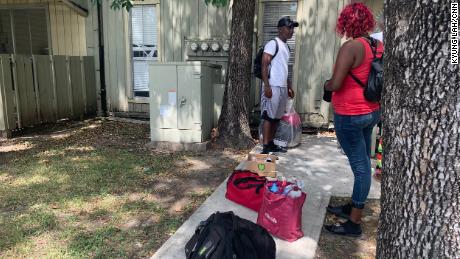America’s evictions crisis hits home
Moments earlier, Deputy Bennie Gant of the Harris County Constable’s Office had knocked on their door to evict them and their parents.
“Constable!” Gant announced.
The father, Israel Rodriguez Sr., answered the door.
“We ain’t got nowhere to go,” he pleaded with Gant and the other Harris County Constable deputies.
Rodriguez had plenty of warning about his non-payment of rent, both from his apartment manager and from the Harris County court. But the warnings didn’t change his circumstances — he still didn’t have the thousands in rent money he owed.


Israel Rodriguez, 24, holds his 20-month-old son, also named Israel.
“Since the Covid-19 issue, I’ve had no significant number of families that are crying like that, men and women,” said Gant, shaking his head as workers threw the family’s possessions onto the sidewalk. “It’s tough. I’ve got six kids, six children myself.”
For many Americans, a weekly $600 stipend from the federal CARES Act helped stall problems with paying rent and other bills. When those payments expired July 31, all the economic pain rushed in, just as eviction moratoriums lifted in the country.
“The CDC order provides crucial temporary relief for renters, but it doesn’t end the eviction crisis,” says Benfer. “Congress must bolster it with significant rental assistance for its purpose to be realized,” she said.
Nowhere to go with $361
“It’s my fault, because I’m supposed to be the man of the house,” said Rodriguez, his voice breaking as he stood with his children in the parking lot of his now-former apartment complex. “We ain’t got nowhere to go right now. It was a lot going on there with the corona. When it hit, I lost my job.”
But Rodriguez was eager to show that he was still managing to earn some money. He pulled a $361 uncashed check out of his pocket. “I wanted to save it for my next apartment,” he said.
In one arm, he carried baby Israel. In front of him, a stroller was stuffed with baby clothes and snacks to carry away what he could.
Rodriguez, 24, says he came to Houston from New Orleans to get away from the street elements that marked his hard upbringing. Without a car, they would have to leave the possessions from their apartment behind. “It’s trash now,” said Rodriguez.
With no family to turn to in Houston, Rodriguez and his girlfriend contemplated where their feet could take them.
They carried a flyer with a list of homeless shelters in Houston, a flyer created by the deputies enforcing the eviction order who work under Harris County Precinct 1 Constable Alan Rosen.
“We’re human beings,” said Rosen. “It’s horrible. It’s horrible to have to evict somebody out of a home. This is their shelter. This is where their family life is.”


Harris County Precinct 1 Constable Alan Rosen wants more federal money to help residents avoid evictions, saying, “This is no one’s fault.”
Rosen oversees a staff of more than 500 — they are officers of the court for the justice of the peace — and executing evictions is among the more heart-wrenching jobs for his deputies during an economic downturn like this one.
While he’ll order his deputies to abide by their statutory obligations, Rosen also said the federal government needs to find a longer-term solution for his city so eviction orders don’t need to be written up.
The fear for Rosen is what economic pain means for public safety and the fabric of his community, especially in communities of color.
“I am calling on the federal government to put additional money locally so that we can continue to help people with rent so that they don’t get kicked out,” said Rosen. “We don’t want this. This is no one’s fault.”
That sentiment was echoed by Deputy Gant, who had eight evictions on his plate. The Rodriguez family’s apartment complex was just his first stop.


Belongings are piled outside an apartment in Houston. When the eviction takes place, everything gets put out and if unclaimed, it’s all thrown away.
The vulnerable
“She’s an elderly lady,” explained Gant, as he arrived at another address.
The tenant didn’t lose her job because of the virus’ economic fallout, but she’s in the age group most at risk for Covid-19, appearing to be older than 65. Gant also couldn’t communicate with the woman, who speaks only Vietnamese.
The landlord told Gant he had raised the rent and the tenant, living on a fixed social security income of $700 per month, refused to pay the $650 monthly rent.
The elderly woman sat on her dining room chair on the sidewalk outside in the triple-digit Houston heat, watching Francisco Munoz carry her belongings onto the street. Munoz was hired by the landlord to move the tenant’s belongings out of the apartment and openly wept as he worked.
“I have a family. I have a sister. I have my mom,” said Munoz, sobbing as the woman watched him move her furniture. “You never know. Today it’s her. Tomorrow it’s me.”


Deputy Bennie Gant with the Harris County Constable’s Office executes a warrant.
Over the course of the day, Gant talked about “statutory obligations.” He’s been a deputy for 35 years, recalling days when he drove evicted residents to homeless shelters. But as the heat index climbed to 110 degrees, Gant told the landlord, “I’m not gonna put her out here in this heat.”
Gant would return the next day, he said, with social services for the woman.


This Houston couple was among those evicted.
As Gant worked on his eight evictions, word came from the Harris County Constable’s office that judges had cleared a backlog of 200 evictions, just for Precinct 1. The county has eight precincts.
“That’s an alarming number to happen all at once,” said Hepburn. “When a neighborhood has more people in densely populated housing, that has negative repercussions on the community, especially in a pandemic.”
The Tuesday evening announcement by the CDC of a new federal eviction moratorium immediately placed evictions in Harris County’s Precinct 1 on hold as county attorneys reviewed how to interpret the new federal guidance.
“These interventions work,” said Benfer. “They are no-brainer, logical kinds of interventions. But when you remove them, and you haven’t addressed the root causes — of the instability and the inability to pay and the lack of living wages or sustainable jobs — it’s going to keep increasing.”
CNN’s Robert Kuznia contributed to this report.
![]()


